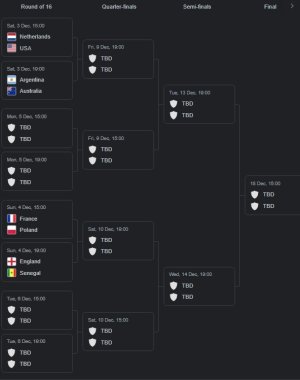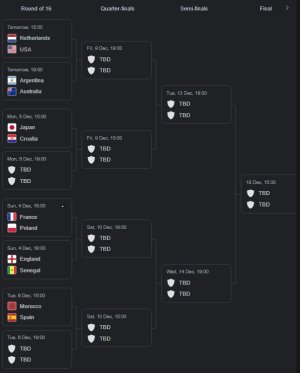How immigration ‘made French football better’
From Polish miners to heroes of Algerian independence, immigrants have greatly influenced French football.
On July 12, 1998, France won the World Cup for the first time in its history, thumping a Brazil side that included stars like Ronaldo, Rivaldo and Roberto Carlos in a final at the Stade de France in Paris.
After the final whistle, hundreds of thousands of joyous French fans poured onto the Champs-Elysees to celebrate the 3-0 victory. A picture of Zinedine Zidane, the mercurial midfielder who had scored two goals that night, was projected onto the Arc de Triumph along with the words “Merci ZiZou” – Zidane’s nickname – and “Zidane President”.
Zidane, a second-generation Algerian immigrant from a working-class area of Marseille, had been part of a team that included players of Armenian, Ghanaian, Senegalese and Guadeloupean descent. As his name rang through the streets, many heralded the victory as a historic footballing achievement and a celebration of a new multicultural France united under one flag.
The success appeared to be the perfect antidote to a nation struggling to come to terms with its colonial past. The Algerian War of Independence (1954-62), which ended 132 years of colonial rule and represented the final collapse of the French empire, had only been recognised as a war by the French state in 1999.
The team, typically known as Les Bleus but nicknamed this time “Black, Blanc, Beur” (Black, White and Arab) in the media during the 1998 tournament, was hailed as a shining example of successful integration. French newspaper Le Monde labelled them a “symbol of the diversity and of the unity of the country”. Then-French President Jacques Chirac described them as a “tricolour and multicolour team” that had created a “beautiful image of France and its humanity”.
Just two years later, the French team would go on to win the European Championships, with the hero of France 98, Zidane, being named player of the tournament.
‘Mirage’
Despite the positivity surrounding the team’s success, simmering racial tensions soon began to reappear.
The victories in 1998 and 2000 had been a source of embarrassment for the far-right party, the Front National (FN). Its then leader, Jean-Marie Le Pen, had infamously claimed in 1996 that the France team was “artificial” as it contained too many non-white players. He would later describe the French side as “unworthy” representatives who did not know the words of the country’s national anthem.
In 2000, 36 percent of respondents to a French survey said they thought there were too many players of foreign origin on the national team.
A year later, France played Algeria in Paris for the first time since the North African nation gained independence in 1962. What was supposed to be a moment of reconciliation descended into “a horrible mess”, says Timothee Maymon, a sports journalist focusing on French football. Before the match, the French national anthem was booed. The match was later abandoned after a pitch invasion in the 76th minute.
“We thought that 1998 and 2000 would be the final part of this new France, playing together, winning together, being able to forget about origins,” says Maymon. However, the events that day showed that idea to be a “mirage”, he adds, noting that the national team would later be used by both sides of the political spectrum when debating the issue of immigration.
In 2002, Le Pen unexpectedly advanced to the run-off of the presidential election registering the highest score ever recorded by the French far right.
Maymon says that although the narrative that projected football as the solution to a more inclusive society was politically convenient, it was, in fact, immigration that had “made French football better”.
“In the right-wing of [French] politics, they often say there are no white players, but actually, if we stayed with only white players, we would not have been able to win two World Cups”, he explains, referring to 1998 as well as France’s second World Cup win, four years ago in 2018 in Russia.
He also highlights the Ballon d’Or, a coveted annual football prize, as epitomising French football’s reliance on immigration. Four of France’s five winners are from non-French backgrounds, including Raymond Kopa, the legendary Real Madrid midfielder who came from a family of Polish immigrants; Michel Platini, who is of Italian origin; and Zinedine Zidane and Karim Benzema, who are both of Algerian heritage.
France’s current team, now competing at the Qatar World Cup 2022, is another example of how immigration has shaped French football. Most players in the starting XI have roots from a wide and diverse set of places, including Dayot Upamecano, who is of Bissau-Guinean descent, and Aurelien Tchouameni, who is of Cameroonian descent.
A long and rich history of diversity
The relationship between French football and immigration to the country dates back to the formation of several teams in the first half of the 20th century. These include RC Lens and AS Saint-Etienne, built around close-knit mining communities composed of Polish and Italian immigrants.
One such player was Stefan Dembicki, or Stanis, who holds the record for most goals scored in a professional match in France after netting 16 for RC Lens in a first-round Coupe de France match in 1942.
At the 1938 World Cup held on home soil, France fielded its first Black player, Raoul Diagne, a versatile defender nicknamed “the Black spider” who was born in French Guiana and was of Senegalese descent.
That same year Morocco-born Larbi Benbarek transferred from the club US Marocaine Casablanca to Olympique de Marseille in France, scoring 10 goals in his first season. He would go on to represent his adopted country, France, 19 times and make 113 appearances for the Spanish club Atletico Madrid, where he earned the nickname “the foot of God”. Brazilian superstar Pelé famously said about him, “If I am the king of football, then Larbi Benbarek is the God of it”.
In the 1950s and 1960s, players who had emigrated from France’s colonies and protectorates in the Maghreb region of north Africa started to impact French football significantly.
Rachid Mekhloufi was one such player. Having just won the French Division 1 in 1956-1957 with AS Saint-Etienne, he was selected to join the French World Cup squad. However, midway through preparations, he fled with several other France-based players of Algerian heritage to Algeria during its War of Independence. There, he played for a team formed by the National Liberation Front (FLN), the armed wing of the Algerian nationalist movement.
When Mekhloufi returned to France after the FLN was disbanded in 1962, he received a heroes’ welcome at Saint-Etienne, a club that Maymon supports and says has always understood the “importance of immigration” in its footballing history.
“Mekhloufi was a hero standing for the independence of his country, but also an immigrant who was able to succeed,” he says.
In the early 1970s, France began to restructure its development system after a decline in performance. The result was a sophisticated academy system that recruited and trained young players, many of whom had grown up in neighbourhoods with a high concentration of immigrants.
Over the following decades, many players with roots in France’s former colonies would go on to represent Les Bleus. They included Marius Tresor, widely considered one of the best defenders of all time, who was born in Guadeloupe, and Amadou Tigana, the renowned midfielder born in Bamako, Mali.
In the 1990s and 2000s, many high-profile players with an immigrant background would establish themselves in the French team, including all-time joint leading goal scorer Thierry Henry, born in the Paris suburb of Les Ulis to parents from Guadeloupe and Martinique.
Today, five of the nine players with more than 100 appearances for France are of non-European heritage.
Differing club identities in French football
During the successive waves of migration during the 20th century, French clubs embraced players of colour with differing levels of tolerance, according to Maymon.
Marseille, a port city on France’s south coast, has a long history of immigration, especially from Italy at the beginning of the 20th century and later from Algeria, Tunisia and Morocco.
This influence has shaped Olympique de Marseille, Maymon says. “You can feel it in the stands; there is never a problem with racism among the fans in Marseille.”
Other clubs, however, have struggled with racist factions among their supporters. PSG, founded in 1970, had struggled with racist hooligan groups that had occupied sections of the so-called Kop of Boulogne stand at the Parc des Princes until 2010, when they were banned from the stadium.
The Paris stadium could be a hostile place for Black players to visit. Patrick Vieira, the former French midfielder of Senegalese descent, referring to his experience at the Parc des Princes once said, “I’d have to think twice before setting foot there again.”
Generation Black, Blanc and Beur
After the World cup success of the Black, Blanc and Beur generation, the France team experienced some tumultuous years, including a player revolt during the 2010 World Cup in South Africa.
However, after narrowly losing the 2016 European Championship final to Portugal, France would win the World Cup again in 2018.
Just as it had been 20 years earlier, the France squad was a melting point of different ethnicities, with 17 of the 23 players in the squad eligible to play for at least one other country.
Among them was Kylian Mbappe, who has a father from Cameroon and a mother from Algeria and was voted the best young player of the tournament. Another standout player of the tournament was Paul Pogba, a Muslim with Guinean parents, who, like Mbappe and many other players in the team, had grown up in the suburbs of Paris.
In the international media, the success of the multiethnic French team was widely-covered and, in most cases, celebrated. US-based South African comedian Trevor Noah joked on The Daily Show after France’s victory that “Africa won the World Cup”.
His comments sparked a strongly worded response from French Ambassador Gerard Araud.
“By calling them an African team, it seems you are denying their Frenchness,” Araud said, adding: “This, even in jest, legitimises the ideology which claims whiteness as the only definition of being French.”
The footballing success of second and third-generation immigrants was not confined to the France team. At the same tournament, 28 players born and trained in France were playing for other teams.
France came to the 2022 World Cup in Qatar after a closely contested presidential election race between centrist Emmanuel Macron and nationalist rival Marine Le Pen, the daughter of Jean-Marie Le Pen, earlier in the year.
Le Pen’s campaign centred largely on proposals targeting immigration and Islam, including a proposed ban on Muslim headscarves in public.
Macron eventually won, but Le Pen’s National Rally (RN) party, formerly FN, captured 89 seats in the National Assembly, making it the biggest opposition party in the lower house.
As France advance in the tournament, the hope will be that the success of its multiethnic team will distract from the simmering racial tensions that underpinned the presidential race.
However, in the build-up to Qatar 2022, French newspaper Le Canard published a cartoon depicting Qatari footballers as terrorists, sparking outrage on social media, with users calling out its “blatant Islamophobia” and “racism”.
France dismantled Australia 4-1 in their first group-stage game on November 22, followed by a 2-1 victory over Denmark four days later in a game that saw Mbappe score both goals.
In their final group stage game on November 30, France will face Tunisia, a country with several French-born players in their squad, including Naim Sliti and Wahbi Khazri.
French defender Raphael Varane speaking ahead of the match, said, “We have seen that it [Tunisia] is a team capable of hurting us on the counterattack in space, who presses with lots of energy.
“The Tunisians will fight for a victory, and it will be up to us to counter them.”
Al-Jazeera










 :
: ) Argentina
) Argentina 